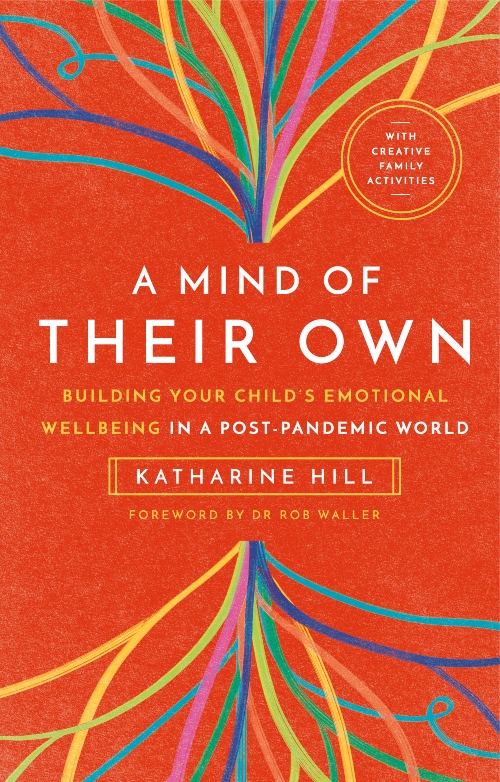Building your child’s emotional resilience
While resilience used to be thought of as a characteristic that you either had or did not have, it is now viewed as a skill that can be learnt. So how do we teach this important quality to our children?
Katharine Hill from Care for the Family shares her top tips
 In recent years, the emotional wellbeing of our children has attracted increasing media attention. It seems that hardly a week goes by without headlines about rising numbers of referrals due to mental ill health. The universal rise in stress levels during the pandemic has also resulted in more negative patterns of thinking and feeling. As 14-year-old Chloe poignantly summed up: ‘I don’t think I’ve ever felt so consistently sad for so long.’
In recent years, the emotional wellbeing of our children has attracted increasing media attention. It seems that hardly a week goes by without headlines about rising numbers of referrals due to mental ill health. The universal rise in stress levels during the pandemic has also resulted in more negative patterns of thinking and feeling. As 14-year-old Chloe poignantly summed up: ‘I don’t think I’ve ever felt so consistently sad for so long.’
But before we start worrying about the potential effects of COVID-19 on children’s emotional wellbeing, it’s important to recognise that whilst some will need professional help, generally we are seeing normal reactions to an abnormal situation. Our young people are undoubtedly growing up in a world full of pressure, challenge and risk … but it is also a world of wonderful opportunity and potential. As parents, we want them to navigate that world with confidence and hope, and a key way in which we can do this is to help build emotional resilience.
Resilient children tend to be more optimistic and motivated, think more creatively, develop strategies for problem-solving, enjoy good friendships, communicate well and have higher self-esteem. Psychologists used to define emotional resiliency as ‘the ability to bounce back’ and recover from a setback in life, but today, they say that rather than just ‘bouncing back’, it’s also about ‘bouncing forward’. In other words, it’s about not only getting back to normal after facing difficulty, but learning from the process in order to deal with the next challenge that comes along.
Whilst resilience used to be thought of as a characteristic that you either had or did not have, it is now viewed as a skill that can be learnt. So how do we teach this important quality to our children? Here are some of my top practical tips:
-
Don't try to fix everything. Give children a chance to find their own solutions to minor problems and frustrations without immediately rushing in to rescue them. And as long as it’s safe, let your child experience the outcome of an action or behaviour. If they forget their sports kit, missing the match will teach them more than you frantically driving to school with it.
-
Teach forgiveness. Researchers have found that forgiveness is important to our happiness, and unforgiveness can even lead to anxiety and depression. Children who learn not to hold grudges take the initiative to resolve breakdowns in relationships and are able to move on from having negative feelings about the past.
-
Talk to your children about your own failures. When we are open about our failures they learn that it isn’t the end of the world and that being an adult doesn’t mean you always get everything right.
-
Help your child to take responsibility for a setback. When something doesn’t work out for them, draw up a pie chart with them and ask them to decide: How much was due to me? How much was due to someone else? How much was simply due to circumstances – for example, not having an essential piece of equipment or being in the wrong place at the wrong time?
-
Remember that important word ‘yet’. Reassure your child that not being able to do something now, doesn’t mean they’ll never be able to do it or that they’re a failure. ‘You don’t know how to do it … yet’ communicates possibility and the sense that the only thing standing between them and what they want to do is time and practice.
-
Remind them of past successes. Children can very quickly become discouraged about their ability to do new things, so take time to give them clear examples of where their hard work and patience led to success.
-
Affirm your child’s efforts and good qualities. Don’t limit praise to successes or achievements; recognise their other attributes. For example, ‘You were so kind to that new boy in school. Well done!’ Affirmations that don’t depend on any kind of achievement are important for building their wellbeing and self-esteem.
Of course, we want to protect our children and want their lives to be as stress-free as possible, but the reality is that they’ll experience knocks and setbacks every day. They are unlikely to pass every test, win every match, succeed in every job interview. We can’t, and shouldn’t, remove all the challenges, but we can help them see negative events as part of everyday life, and pass on skills to help them cope with stress and adversity.
The lessons that our children learn about resilience when they are young, including in this season of the pandemic, will set them up for a lifetime process of dealing well with whatever challenges are thrown their way.
Katharine Hill is UK Director for Care for the Family, and speaks and writes on family matters.
She is the author of A Mind of their Own – Building Your Child’s Emotional Well-Being in a Post-Pandemic World, published by Muddy Pearl
Do you have a view? Share your thoughts via our letters' page.
Baptist Times, 10/06/2021